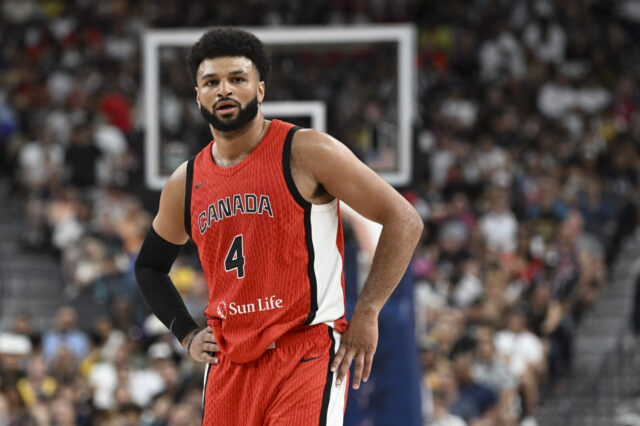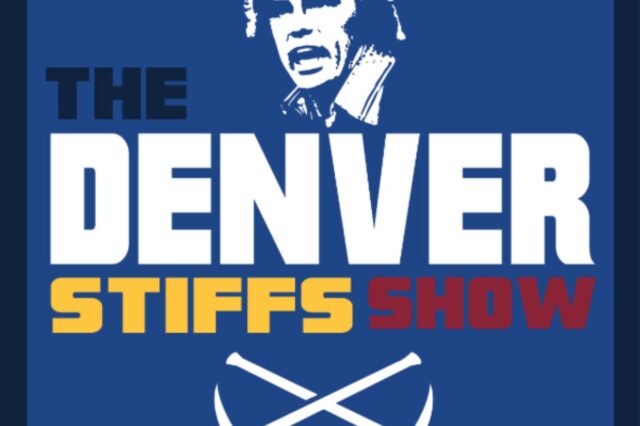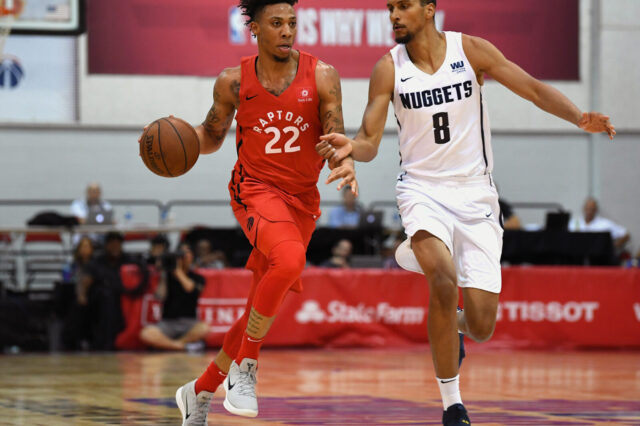Elijah Hughes – Syracuse
Elijah Hughes is a New York native that displayed steady development throughout his college career. A top-200 recruit following his senior season of high school, Hughes initially attended East Carolina before transferring to a Syracuse program coached by the legendary Jim Boeheim.
Hughes became a full-time starter in his first season at Syracuse (he didn’t play in 2017-18 due to the NCAA’s rules regarding transfer eligibility) and became the team’s go-to scorer in 2019-20 after the departure of junior wing Tyus Battle. He was subsequently named a first team All-ACC selection, leading the conference in points (609) and minutes played (1,175) while ranking second in the conference in 3-point field goals (78).
Physical Traits
Age: 22 (born March 10, 1998)
Height: 6’6”
Weight: 215 pounds
Wingspan: 6’10”
College Stats
| Season | School | G | GS | MP | FG | FGA | FG% | 3P | 3PA | 3P% | FT | FTA | FT% | ORB | DRB | TRB | AST | STL | BLK | TOV | PF | PTS |
|---|---|---|---|---|---|---|---|---|---|---|---|---|---|---|---|---|---|---|---|---|---|---|
| 2016-17 | East Carolina | 25 | 7 | 20.5 | 2.3 | 6.6 | .349 | 1.0 | 3.5 | .273 | 2.2 | 3.2 | .684 | 0.4 | 1.9 | 2.3 | 1.3 | 0.6 | 0.4 | 1.0 | 1.8 | 7.8 |
| 2017-18 | Tran | |||||||||||||||||||||
| 2018-19 | Syracuse | 34 | 34 | 32.7 | 4.6 | 10.9 | .420 | 2.6 | 6.9 | .369 | 2.0 | 2.7 | .742 | 0.7 | 3.6 | 4.3 | 1.5 | 1.2 | 0.8 | 1.9 | 2.1 | 13.7 |
| 2019-20 | Syracuse | 32 | 32 | 36.7 | 6.2 | 14.5 | .427 | 2.4 | 7.1 | .342 | 4.2 | 5.2 | .813 | 0.4 | 4.5 | 4.9 | 3.4 | 1.2 | 0.8 | 2.3 | 1.8 | 19.0 |
| Career | Overall | 91 | 73 | 30.7 | 4.5 | 11.0 | .411 | 2.1 | 6.1 | .342 | 2.8 | 3.7 | .763 | 0.5 | 3.5 | 4.0 | 2.1 | 1.0 | 0.7 | 1.8 | 1.9 | 13.9 |
| Syracuse | 66 | 66 | 34.6 | 5.3 | 12.6 | .424 | 2.5 | 7.0 | .356 | 3.1 | 3.9 | .788 | 0.6 | 4.1 | 4.6 | 2.4 | 1.2 | 0.8 | 2.1 | 2.0 | 16.3 |
Strengths
Cutting
Hughes knows how to take advantage of players that overplay him on the perimeter, often making timely cuts for easy baskets. His athleticism serves him well in creating separation and finishing at the rim
Jump shooting
Although Hughes hasn’t been the most efficient 3-point shooter, with a career 3-point percentage of .342 in college, he’s displayed deep range and a soft touch on his shots from beyond-the-arc whether he’s spotting up or pulling up. Hughes has also shown the ability to be a shooting threat in transition, to be adept at shooting off of screens and a solid shooter in the midrange.
Shot-blocking
Whether it’s on the perimeter or around the rim, Hughes has shown the timing, effort and physical ability to turn back shots despite ‘only’ being 6’6.” Averaging about one block a game for two consecutive seasons might not seem all that impressive in a vacuum but it’s actually a really good number for a player his size.
Team defense
Hughes has a knack for recognizing plays and closing out on 3-point shooters. He’s also a strong communicator on the backline of Syracuse’s defense and exceptional on the defensive boards.
Finishing
Hughes is a crafty finisher around the rim whether he’s attacking off-the-dribble or making a methodical move towards the rim with a post-up.
Weaknesses
Man-to-man defense
Simply by virtue of playing for Syracuse, there are going to be questions about his ability to play man-on-man defense; Syracuse is known for playing a zone defense. Hughes is a solid athlete whose has nice defensive instincts though, so he may be a respectable individual defender.
Playmaking
Hughes’ passing ability developed throughout his college career, leading to him averaging a career-high 3.4 assists per game last season. However, he’s only an adequate ball-handler and makes too many mistakes when moving the ball (his career assist-to-turnover ratio is nearly 1:1).
Slashing
Hughes’ handle isn’t tight enough and his first step isn’t fast enough to consistently get all the way to the rim when he’s attacking off-the-dribble.
Expected Outcome
Projected Draft Range: Early-to-mid second round
Denver Stiffs Big Board: 46th overall
NBA Comparison: Gerald Henderson
You would be hard-pressed to find a mock draft that has Hughes being selected in the first round, but multiple mocks project him to be taken by the middle of the second round. Hughes would be great value in the second round because of his potential as a quality rotation player.
While there are a number of analysts comparing Hughes to NBA guard Malik Beasley, the former has displayed the potential as a weak side shot-blocker and the streaky shooting that’s more akin to former NBA wing Gerald Henderson.
Highlights
Why Hughes makes sense for Denver
If it wasn’t made abundantly clear during the 2020 NBA Playoffs, the Nuggets need a contingency plan in case one of their wings — say Gary Harris or Will Barton — was to be unavailable for an extended period of time.
That’s where Hughes comes in. Not to say that Hughes will be trusted by Nuggets head coach Michael Malone as a rookie nor that he’ll be ready to contribute in a meaningful manner from Day 1. However, his skillset is a combination of both Harris and Barton’s, which provides Denver with a player who they can plug-in and play as a quasi-replacement for either.
Because Barton was unable to play in either the seeding or playoff games, the Nuggets were missing a player who could be counted on to create their own offense outside of Jamal Murray and Nikola Jokic. Hughes is no Kevin Durant but he led the ACC and was ranked fourth in the NCAA in isolation scoring.
He can get the ball in the basket in a variety of ways and that’s a skill that could in handy.
In an effort to replace Harris, it won’t be on the defensive end that he makes his mark (although his team defense should be admirable) but on offense. Harris has excelled at playing off of Jokic as a cutter and spot-up shooter, which Hughes can replicate.
An older prospect at 22-years-old and having three years of college experience only helps his case with Denver, who will be competing for championships in the future.
Why Hughes doesn’t make sense for Denver
The Nuggets may resist drafting Hughes because of the questions surrounding his ability to play man-to-man defense. In addition, because there’s already an abundance of young players on the roster, they may not be too keen to add a rookie to the group.
However, the main reason that Hughes doesn’t make sense for the Nuggets is because Denver can get better value with the 22nd overall pick in the draft. Even if they were to purchase or trade for a second-round pick, they would be using extra assets to acquire a player who might never see the floor.
Unless the Nuggets trade back from the 22nd spot to select a particular prospect and pick up an extra second-round pick in the process to take Hughes, it doesn’t make sense for Denver to draft him. This is particularly true when looking at the bevy of experienced wings that the Nuggets will be able to sign for the cheap when free agency begins.
Bottom line
Talented and a player whose skillset (mostly) fits what the Nuggets needs on the wing, Hughes would be terrific depth for Denver at either wing spot. Unfortunately, with the Nuggets’ current combination of youth, defensive deficiencies and championship aspirations, Hughes probably isn’t an ideal pick with the 22nd overall pick in the 2020 NBA Draft.
This content is no longer available.


